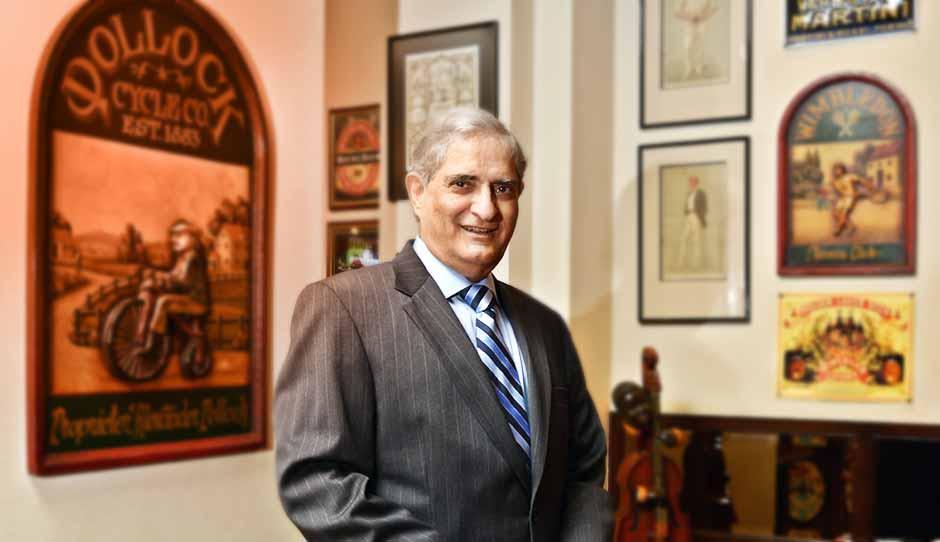Room to Grow: How Anil Madhok Built Sarovar Hotels
- BY Sonal Khetarpal
 In
In  31170
31170 0
0

Much like the sharp suits he wears, Anil Madhok, MD, Sarovar Hotels and Resorts, seems cut out for success. As a professional, he rose to become the vice president of operations at the The Oberoi Hotels and Resorts. But, that wasn’t enough. In the mid 1990s, he founded Sarovar Hotels, a hotel management company which has grown into a leading hotel company in the country with five brands, 60 hotels and more than 5,000 rooms under his management. Yet, even at 67, he’s ambitious for more although he doesn’t like setting targets. “We constantly exceed the ones we set,” he says.
Enamoured by the army, I decided to leave my bachelor’s in Economics at the University of Delhi and join the profession of the brave and the strong. But, as I was about to begin my army training, I stumbled upon the hotel management programme offered by the Oberoi School of Hotel Management. In any case, my parents were not keen on enrolling me in the army and pushed me to sit for the Oberoi entrance exam. I cleared the exam, and opted to join hotel management over the army.
It was an intensive programme. We had 12 hour days with six hours of on-the-job training and the remaining six of classroom teaching. I was just about finishing my course when I got my first job as a management trainee with The Oberoi, New Delhi in 1966. Two years later, I was promoted and became their restaurant manager. There was no looking back after that.
I worked with the Oberoi Hotel and Resorts for the next 25 years. It was a rewarding career. I was given the opportunity to work in interesting positions across Mumbai, Colombo and Singapore. What I value most about my innings with the Oberoi is that I worked very closely with the chairman, Rai Bahadur M.S. Oberoi, and vice chairman, Prithvi Raj Singh Oberoi. There was a lot to learn from them—it was phenomenal the level of detail they brought to conceptualising, designing and executing a hotel. With their guidance, I gradually became the vice president of operations. Even then, out of my interest, I was actively involved in the planning and conceptualising of the newer properties. There’s great joy in working on a property from its initial blueprint to the final stage of completion. The Oberoi, Singapore stands out in my memory precisely for that. Though it was an existing 600-room property, it underwent a major refurbishment when I was there from 1978 to 1982.
It was simple—none of the big chains were looking at small hotels. We were virtually the only company to do so.
The hotel industry provides you a comfortable working environment spent in great surroundings. After a few years in my job, I could organise parties for two hundred people at the drop of a hat. I had access to unlimited resources, and the best of everything. But, a chance meeting with the President of Walt Disney Parks and Resorts in Singapore in the early 1980s put things in a different perspective for me. He called a hotelier’s life a mirage—of living like a king, and wining and dining with the finest people and falling into the trap of believing you’re one of them. It’s a make-belief world, he cautioned. His thoughts stuck in my mind. I’d often think about what he said. Finally in 1991, after ten years of that meeting, I decided to move on from the Oberoi.
I had plans of starting out on my own. But, decided to take up an offer from the Al Bawadi group in Dubai to help them embark on their hotel business. That was a short stint. I didn’t enjoy the work and I came back to India after 18 months at the end of 1993. Once home, I didn’t wait any longer. Due to the liberalisation in 1991, there were a lot of hotels mushrooming everywhere but there was no company to manage them. So, I started Sarovar Hotels and Resorts in 1994 with Rs50,000 from my personal savings. I believed there was an opportunity to give a burgeoning, amateur hotel industry access to operational expertise, and I could do that. Once I began Sarovar Hotels, I was determined to take a real go at it. In fact, soon after I started out, Manu Chhabria, the liquor baron and founder of the Jumbo Group, offered me to join his hotel business. He said my idea of a one-man hotel management company was too far-fetched, and I should join his hotel business. But, I remained firm on Sarovar.
 As a start-up entrepreneur, Madhok realised that,"You are the typist, peon and clerk all rolled into one."
As a start-up entrepreneur, Madhok realised that,"You are the typist, peon and clerk all rolled into one." The initial years were quite difficult. When you are working for an established brand, the infrastructure backs you up. As a start-up entrepreneur, you are the typist, peon and clerk all rolled into one. Building the infrastructure ground up is a huge challenge. It’s a conundrum, a chicken-and-egg situation really—do you wait till you make the money to invest in infrastructure, or does it work the other way around? Also, an entrepreneur has to be extremely prudent when it comes to managing finances. As we went along, I continued to pump in my personal savings, as a loan, into the business for our expansion. And, I always ensured the revenue from expansion pays for the infrastructural development.
Our first project was Bogmallo Beach Resort, a 126-room hotel in Goa, in 1994. Oberoi Hotels had terminated their contract with them and the owner asked me to manage the hotel. But, our first big push came with the Marine Plaza, Mumbai in 1996 though. It was an old, rundown hotel that had been shut for several years. Although it was only a 60-room hotel, we positioned it right. After we opened it for business in 1996, it did exceedingly well. Undoubtedly, we were fortunate to keep bringing in good hotels such as Park Plaza, Ludhiana and Muthoot Plaza, Trivandrum in the early years. Of course, there was an element of being in the right place at the right time, but I would credit ourselves for figuring out the right approach to business. It was simple—none of the big chains were looking at small hotels. We were virtually the only company to do so.
The biggest change in my role from when we began to now is that I’ve let go of a lot of decision-making power.
Things have continued at a brisk space for us since then. The mid-2000s until now have been a period of much activity. In 2005, we introduced Sarovar Premiere, Sarovar Portico and Hometel to our portfolio of Park Plaza and Park Inn hotels. Sarovar Premiere has full-service, four and five star hotels that target the upmarket crowd whereas Hometel is a limited service brand of budget hotels for the huge middle class segment. Our other brands, Sarovar Portico and Park Inn have three and four star no-frills and full service hotels. The mid 2000s was also when we raised our first round of funding, Rs37.5 crore from Bessemer and New Vernon in 2006. In all, we today manage 60 hotels and resorts across 40 cities in India and overseas.
Getting the right people from the hotel industry—those who would be willing to leave big brands like Taj and Oberoi to join a start-up company with an uncertain future—was a big challenge. To attract people, we had to create a culture in which people could feel they can grow and thrive. Having been an employee for almost 25 years helped me to empathise with the problems they face, and understand the environment people want at a workplace. By the end of the first year, we had around 25 people in our company. Today, we have close to 1,000 employees on the payrolls of Sarovar Hotels. Another 7,000 people work in the many properties we manage. The biggest change in my role from when we began the company to now is that I’ve let go of a lot of decision-making power. As an organisation grows, it’s critical to delegate most of the operational work so that the entrepreneur can concentrate on more profitable tasks such as strategies for Having been an employee for almost 25 years helped me to empathise with the problems they face, and understand the environment people want at a workplace. By the end of the first year, we had around 25 people in our company. Today, we have close to 1,000 employees on the payrolls of Sarovar Hotels. Another 7,000 people work in the many properties we manage.
Planning and reviewing is an ongoing process. You can’t do it once, and leave it. The moment you stop thinking, you just stop growing." - Anil Madhok
The biggest change in my role from when we began the company to now is that I’ve let go of a lot of decision-making power. As an organisation grows, it’s critical to delegate most of the operational work so that the entrepreneur can concentrate on more profitable tasks such as strategies for growth, negotiating new contracts and reviewing the infrastructure and the expansion plans. I still outline the parameters and the principles for work although I have to admit, I don’t believe much in milestones. Every time I’ve set a target for the company, we’ve exceeded it, and I had to recalibrate all over again to see if we could manage the “excess”—the infrastructure required, the new projects—and outline, a new and revised plan for the future. Planning and reviewing is an ongoing process. You can’t do it once, and leave it. The moment you stop thinking, you just stop growing.
We have a growth map well charted out for the future. We plan to manage more than 85 hotels by 2014. Currently, we are in a major expansion spree in South India. We have 13 operational hotels in different parts of South India and we plan to open eight more—some of them we’ve invested in, like the one in Chennai which we are looking forward to. With the Telangana issue in Andhra Pradesh, several companies are shifting their base to Chennai, creating an opportunity for the hotel industry to flourish there. We are also targeting religious destinations and opening hotels in Bodh Gaya, Tirupati, Amritsar and Rishikesh to cater to the increasing number of pilgrims and tourists. We are also focusing on expansion in East Africa. At present, we operate three hotels in Africa—Ole Sereni in Nairobi, New Africa Hotel in Dar-es-Saleem, and Heron Portico in Nairobi. The company is planning to add two more hotels—a 100-room hotel in Nairobi and another hotel by the game park there. Our expansion into Africa is in tune with the way we approached the Indian market when we started out. Like India, Africa has great potential but everyone seemed to be overlooking it. We wanted to focus on a market that everyone seemed to have ignored, or didn’t know how to make it work into a viable business. We have been growing for the past two years at around 35 per cent, and we are confident our focus on India and Africa can continue to deliver that growth to us for the years to come. Of course, the slowdown is a worry, and our core market in India has been affected. If market conditions were better, we could accelerate our growth. But, that doesn’t mean we will chase more markets because we want an X pace of growth. In fact, it’s even more critical to stay focused—we don’t want to expand to Europe, Far East or any other geography, and not be able to handle it.





























Add new comment